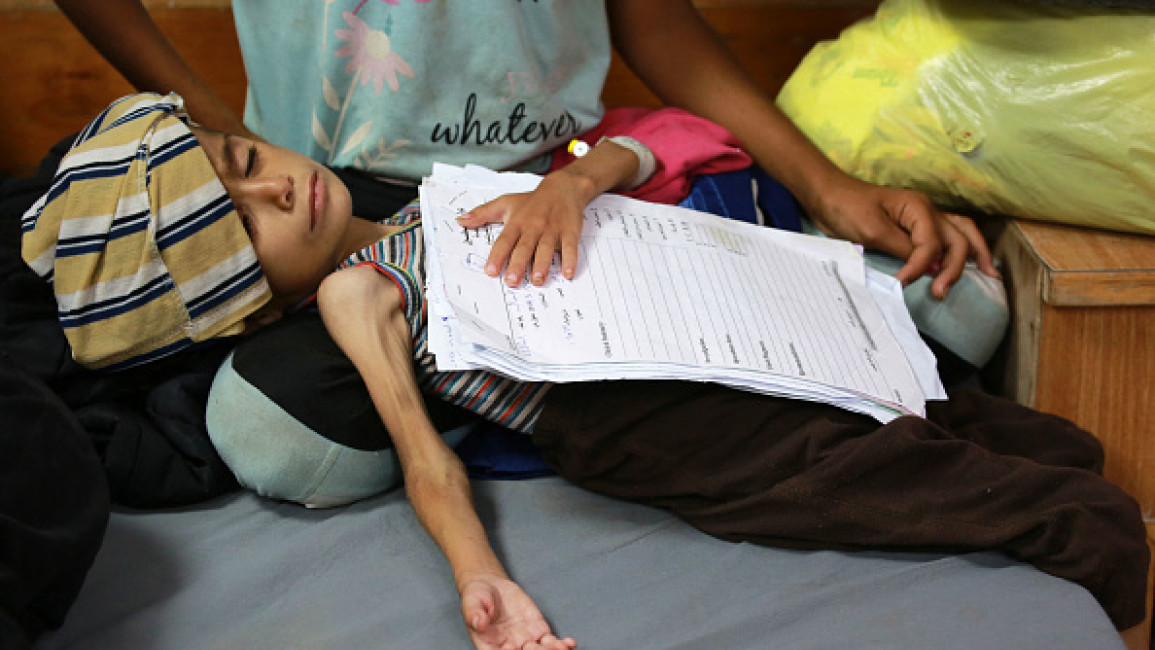Widespread backlash against 'The Atlantic' as it tries to 'justify killing Gaza's children'
US news publication The Atlantic has received heavy criticism in recent days over the publication of an article earlier this month that seemed to argue for the legality of killing Palestinian children during wartime.
The article, written by The Atlantic's staff writer and Yale University lecturer Graeme Wood, was published on May 17 and tried to cast doubt on the UN's recent statistics on the Gaza war.
In his criticism of the casualty figures reported by the UN Office for the Coordination of Humanitarian Affairs (OCHA), the writer was accused of trying to play down Gaza's devastating humanitarian crisis and potentially justifying violence against civilians, particularly children.
Wood's article has since resurfaced online this week which has further elicited backlash by critics.
Here is The New Arab's breakdown of the controversial piece and why some have criticised Wood.
What did the piece say?
In his piece, Wood claimed that casualty numbers reported by the Gaza Ministry of Health, and subsequently used by the UN, were inflated and unreliable.
He suggested that these figures, which currently stand at 36,224 killed and 81,777 wounded, were not properly verified and said that Hamas was manipulating data for "propaganda" purposes.
However, UN experts and rights groups have continually pushed back against attempts by Israel and its supporters to cast doubt on Gaza's civilian death toll, highlighting that the health ministry had provided accurate statistics during previous Israeli wars on Gaza.
Wood tried to provide balance by saying the Israeli government's conduct in the war also "deserves reproach", highlighting as the restriction of independent access to Gaza by all foreign media.
However, Wood also emphasised that in any conflict "when conducted legally, war is ugly".
Referencing the Israeli military's attacks in Gaza, he added that "it is possible to kill children legally, if for example one is being attacked by an enemy who hides behind them."
What have critics said?
Following the release of the article two weeks prior, Wood reshared his piece on his official account on X on Tuesday, stating that it would be accessible for free.
Social media users began picking up the story and shared their condemnation of Wood's piece.
Defending child murder is egregious; but @TheAtlantic has historically defended imperial bloodshed. https://t.co/EBxrWHrZ65
— Writers Against the War on Gaza (@wawog_now) May 27, 2024
Anger was further enflamed as the sharing of the story coincided with an Israeli strike on Sunday which set ablaze a crowded camp in the southern Gaza Strip city of Rafah, killing 45 people including children.
Many of the victims were burned alive.
Two days after the attack, another Israeli strike killed at least 21 people at a displacement camp west of Rafah Tuesday.
People took issue with Wood's justification of killing non-combatants in conflict zones during certain conditions, particularly in the case of Gaza.
Critics pointed out that his stance contradicts the ethical duty nations possesses to avoid civilian casualties.
Groups such as Writers Against the War on Gaza denounced the piece, writing in a post on X that "defending child murder is egregious, but The Atlantic has historically defended imperial bloodshed."
International law expert Dr. Luigi Daniele, a senior lecturer at Nottingham Trent University, told The New Arab that Wood's arguments ignore Israel's responsibility to distinguish between military targets and civilians, in accordance with international law.
Daniele said that the Geneva Conventions have set strict guidelines on the conduct of war, including the protection of civilians.
"There are so many misconceptions about this, which are driven by an incomprehensible bias in favour of the [Israeli forces] that has been going around for a long time in Western academia," he said.
"IHL [International Humanitarian Law] doesn't prohibit the causation of civilian deaths in attacks. However, this is only admissible if it is incidental- which means lateral consequence- and not excessive in comparison to a military advantage."
Daniele continued, "This is not the case with the attacks that we are witnessing since October. These are attacks that have systematically accepted a virtually certain consequence of killing dozens of civilians and children.
"Another legal aspect to consider is that there is a customary rule under the law of war, which means that that it is stronger than treaties and binding for everyone, that prescribes the special protection of children in armed conflicts.
"This is very explicit in the rule, which to me the only possible reading of this customary norm is that the proportionality evaluations, when children are expected to be harmed or killed, cannot be the same as if they were adults. We need to interpret very restrictively when it comes to proportionality and collateral damage, especially when the expectation and foreseeable outcome is harming or even killing children."
Figures provided by Gaza's health ministry and the United Nations have shown that the majority of the casualties in Gaza have been women and children and Israel has targeted residential areas, schools, and hospitals in its ferocious military campaign against the Palestinian territory







 Follow the Middle East's top stories in English at The New Arab on Google News
Follow the Middle East's top stories in English at The New Arab on Google News
![Archbishop Hanna [Getty]](/sites/default/files/styles/image_330x185/public/1232952067.jpeg?h=edfda2ae&itok=ga18er46)

